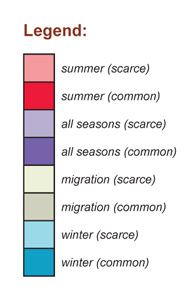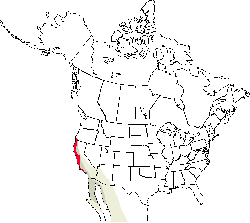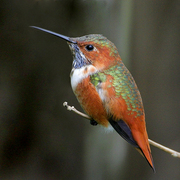Allen's Hummingbird
Selasphorus
sasin
Apodiformes
The order, Apodiformes, contains the swifts and hummingbirds, birds that at first glance seem to have little in common. Both groups, however, are similar in the structure of their wings, modified for very rapid movement and both have tiny legs. Both swifts and hummingbirds also have only 10 tail feathers, not 12 like most other birds, and they share similarities in cranial structure. Swifts are found over much of the world, but hummingbirds are found only in the Americas. Both families are represented in Washington:
Trochilidae
Hummingbirds are tiny, nectar- and insect-eating birds. Their unique manner of flight allows them to fly forwards, backwards, or hover in one spot. Hummingbirds are found only in the Western Hemisphere, and most are found in tropical areas. Of the species that live in Washington, all but one migrate south in the winter. Male hummingbirds often have an iridescent throat patch called a "gorget." The females build the nests, incubate, and feed the young without assistance from males. Hummingbirds are among the smallest of warm-blooded animals and often consume more than half their total weight in food and twice their weight in water in a single day.
General Description
Only state record is of a male collected in Seattle in May 1894.
North American Range Map


Family Members
 Ruby-throated HummingbirdArchilochus colubris
Ruby-throated HummingbirdArchilochus colubris Black-chinned HummingbirdArchilochus alexandri
Black-chinned HummingbirdArchilochus alexandri Anna's HummingbirdCalypte anna
Anna's HummingbirdCalypte anna Costa's HummingbirdCalypte costae
Costa's HummingbirdCalypte costae Calliope HummingbirdStellula calliope
Calliope HummingbirdStellula calliope Broad-tailed HummingbirdSelasphorus platycercus
Broad-tailed HummingbirdSelasphorus platycercus Rufous HummingbirdSelasphorus rufus
Rufous HummingbirdSelasphorus rufus Allen's HummingbirdSelasphorus sasin
Allen's HummingbirdSelasphorus sasin

